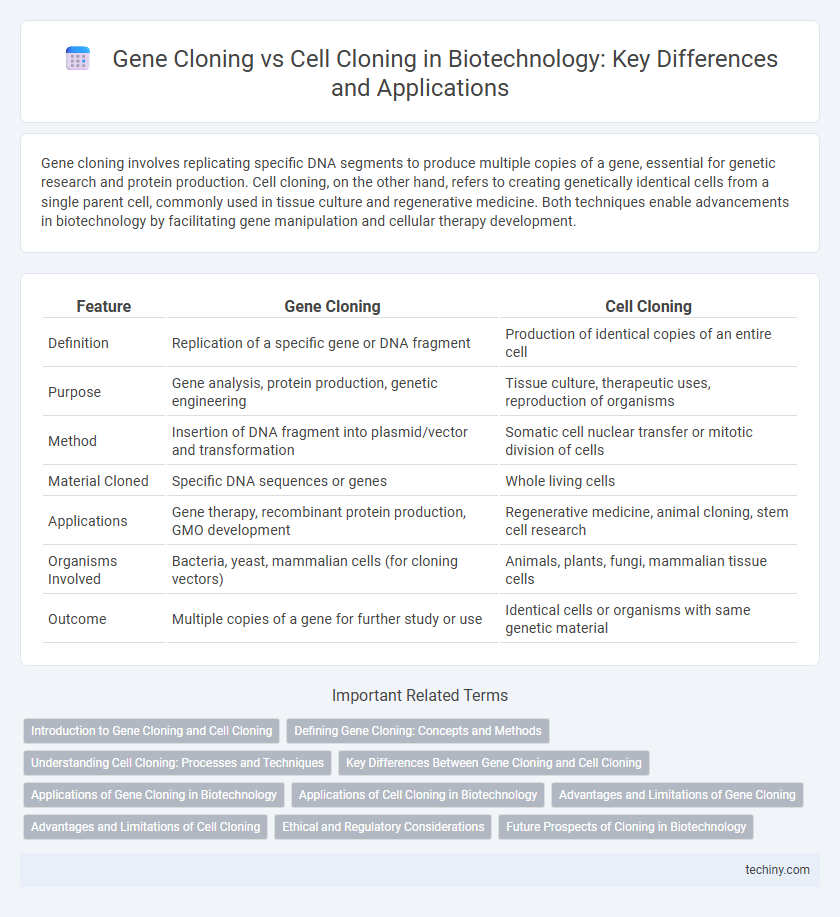Gene cloning involves replicating specific DNA segments to produce multiple copies of a gene, essential for genetic research and protein production. Cell cloning, on the other hand, refers to creating genetically identical cells from a single parent cell, commonly used in tissue culture and regenerative medicine. Both techniques enable advancements in biotechnology by facilitating gene manipulation and cellular therapy development.
Table of Comparison
| Feature | Gene Cloning | Cell Cloning |
|---|---|---|
| Definition | Replication of a specific gene or DNA fragment | Production of identical copies of an entire cell |
| Purpose | Gene analysis, protein production, genetic engineering | Tissue culture, therapeutic uses, reproduction of organisms |
| Method | Insertion of DNA fragment into plasmid/vector and transformation | Somatic cell nuclear transfer or mitotic division of cells |
| Material Cloned | Specific DNA sequences or genes | Whole living cells |
| Applications | Gene therapy, recombinant protein production, GMO development | Regenerative medicine, animal cloning, stem cell research |
| Organisms Involved | Bacteria, yeast, mammalian cells (for cloning vectors) | Animals, plants, fungi, mammalian tissue cells |
| Outcome | Multiple copies of a gene for further study or use | Identical cells or organisms with same genetic material |
Introduction to Gene Cloning and Cell Cloning
Gene cloning involves creating identical copies of a specific DNA sequence by inserting it into a vector, such as a plasmid, which is then introduced into a host organism for replication. Cell cloning refers to producing genetically identical cells by isolating a single cell and culturing it to generate a population of clones. Both techniques are fundamental in biotechnology for genetic analysis, protein production, and therapeutic applications.
Defining Gene Cloning: Concepts and Methods
Gene cloning involves the isolation and replication of a specific DNA sequence using recombinant DNA technology, typically via insertion into vectors such as plasmids, followed by propagation in host organisms like bacteria. This method enables the production of multiple copies of a target gene for sequencing, analysis, or protein expression. In contrast, cell cloning refers to generating identical copies of entire cells through processes like mitosis or somatic cell nuclear transfer, focusing on replicating cellular genomes rather than individual genes.
Understanding Cell Cloning: Processes and Techniques
Cell cloning involves creating genetically identical cells through methods such as somatic cell nuclear transfer (SCNT) and cell culture propagation, which enable the replication of specific cell lines for research or therapeutic purposes. This technique allows for the study of cellular functions, disease modeling, and regenerative medicine by producing uniform populations of cells with consistent genetic makeup. Unlike gene cloning, which isolates and replicates specific DNA sequences, cell cloning focuses on duplicating entire cells, thus preserving their complete genomic integrity.
Key Differences Between Gene Cloning and Cell Cloning
Gene cloning involves the creation of multiple copies of a specific gene or DNA segment using molecular techniques such as recombinant DNA technology, whereas cell cloning refers to producing identical copies of an entire cell through processes like somatic cell nuclear transfer or mitotic division. Gene cloning targets the replication of genetic material for research, medicine, and genetic engineering, while cell cloning focuses on generating whole organisms or tissues for regenerative medicine and therapeutic applications. Key differences include the scale of cloning (DNA fragment versus whole cell) and the techniques employed to achieve replication.
Applications of Gene Cloning in Biotechnology
Gene cloning plays a crucial role in biotechnology by enabling the production of recombinant proteins, gene therapy, and genetically modified organisms (GMOs) for improved traits. It facilitates the amplification of specific DNA sequences for research, pharmaceutical development, and diagnostic tools. Unlike cell cloning, which generates genetically identical cells, gene cloning targets individual genes to manipulate and express within various host cells for desired applications.
Applications of Cell Cloning in Biotechnology
Cell cloning plays a crucial role in biotechnology by enabling the production of genetically identical cells for research, therapeutic, and industrial purposes. It facilitates the mass production of genetically modified cells for drug development, regenerative medicine, and vaccine production. This technique supports advancements in personalized medicine by allowing the study of disease mechanisms and the development of targeted treatments.
Advantages and Limitations of Gene Cloning
Gene cloning offers the advantage of producing multiple copies of specific DNA sequences, enabling detailed genetic analysis and the development of recombinant proteins or gene therapies. It allows precise manipulation of genetic material, facilitating advancements in medicine, agriculture, and biotechnology industries. Limitations include the potential for errors during DNA replication, ethical concerns, and the inability to replicate entire organisms or complex cellular functions as seen in cell cloning.
Advantages and Limitations of Cell Cloning
Cell cloning allows for the production of genetically identical cells with applications in regenerative medicine and genetic research, offering precise replication of cellular material. Advantages of cell cloning include the ability to study specific cell functions and develop personalized therapies with high fidelity to original cell characteristics. Limitations involve challenges such as genetic mutations during replication, ethical concerns, and difficulties in maintaining long-term cell viability and differentiation potential.
Ethical and Regulatory Considerations
Gene cloning raises ethical concerns centered on genetic modification risks, potential unintended consequences, and issues of consent, prompting stringent regulatory oversight by agencies like the FDA and EMA to ensure biosafety and ethical compliance. Cell cloning involves debates over identity, ownership, and the moral status of cloned cells, leading to regulations that address cloning limits, consent, and potential for human reproductive cloning. Both practices are subject to international guidelines and national laws designed to balance scientific advancement with ethical responsibility and public safety.
Future Prospects of Cloning in Biotechnology
Gene cloning enables precise replication of specific DNA sequences, facilitating advancements in genetic engineering and personalized medicine. Cell cloning accelerates the production of identical cells, crucial for regenerative therapies and tissue engineering. Future prospects in biotechnology include integrating gene and cell cloning techniques to create tailored treatments, improve disease models, and enhance agricultural productivity.
**Gene cloning vs Cell cloning** Infographic

 techiny.com
techiny.com